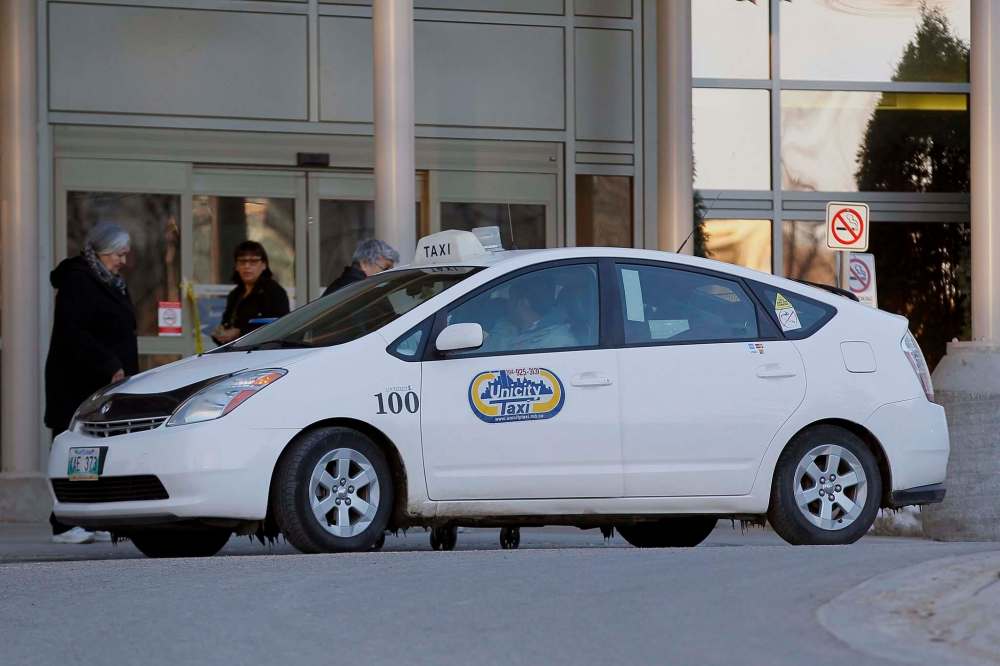Bill 30 takes taxi industry for a ride
Advertisement
Read this article for free:
or
Already have an account? Log in here »
To continue reading, please subscribe:
Monthly Digital Subscription
$1 per week for 24 weeks*
- Enjoy unlimited reading on winnipegfreepress.com
- Read the E-Edition, our digital replica newspaper
- Access News Break, our award-winning app
- Play interactive puzzles
*Billed as $4.00 plus GST every four weeks. After 24 weeks, price increases to the regular rate of $19.00 plus GST every four weeks. Offer available to new and qualified returning subscribers only. Cancel any time.
Monthly Digital Subscription
$4.75/week*
- Enjoy unlimited reading on winnipegfreepress.com
- Read the E-Edition, our digital replica newspaper
- Access News Break, our award-winning app
- Play interactive puzzles
*Billed as $19 plus GST every four weeks. Cancel any time.
To continue reading, please subscribe:
Add Free Press access to your Brandon Sun subscription for only an additional
$1 for the first 4 weeks*
*Your next subscription payment will increase by $1.00 and you will be charged $16.99 plus GST for four weeks. After four weeks, your payment will increase to $23.99 plus GST every four weeks.
Read unlimited articles for free today:
or
Already have an account? Log in here »
Hey there, time traveller!
This article was published 21/04/2017 (3093 days ago), so information in it may no longer be current.
The Progressive Conservative government recently introduced Bill 30, which is one of the most blatant abuses of power in memory in Manitoba.
The title of the bill is relatively innocuous: “The Local Vehicles for Hire Act.” In reality, it might as well be called the Uber Bill, because it clearly aims to dismantle the regulated taxi industry to pave the way for this so-called “ridesharing” company.
There is an irony with the bill. Uber, a company that is estimated to be worth US$70 billion, has broken the law worldwide in its attack on regulated taxi services. Bill 30 abuses the legal power of the province to pave the way for Uber.

Mayor Brian Bowman has made it clear he wants to bring Uber to Winnipeg. There are two problems. First, the City of Winnipeg does not have licensing jurisdiction over taxis; that is provincial jurisdiction. Second, the advent of Uber would devastate hundreds of families that have followed the rules and invested in the regulated taxi system.
The PC solution is to transfer taxi-board jurisdiction to the City of Winnipeg, cancel all provincial licences, establish transitional municipal licences and bring in legislation denying compensation to Manitobans who, in many cases, have poured their life savings into the taxi industry. They also plan to remove rural and northern taxi regulation through the Motor Transport Board and let municipalities bring in Uber and threaten their local regulated taxi systems.
One section in the act goes as far as stating that the government’s actions would not be seen as expropriation, a legal process whereby property owners are compensated for property that is taken for public purpose. There is even a retroactive provision that prohibits people from taking action legally before the bill comes into force.
There is a reason why the PCs have moved to prohibit legal action. There are clear legal and political precedents for individuals being able to seek legal recourse when they are affected by the cancellation of a licence or quota. The provincial government could be liable for the millions of dollars in lost investments by people in the taxi industry.
What is particularly appalling is the way in which this targets an industry where the vast majority of owners are new Canadians, many of whom have invested their life savings in the industry, followed its rules and built a livelihood for their families.
There are many arguments against the deregulation of the taxi industry. In markets where Uber has operated, there has been differential pricing, a lack of equal service to all areas of the municipality, and significant safety issues for both drivers and passengers.
Manitoba has made great strides in taxi safety. After the tragic murder of taxi driver Pritam Deol in 2002, we put in place shields and cameras that made a huge difference in terms of safety. There is also a stringent complaint mechanism for passengers.
It is one thing to look at ways to improve the taxi industry but the government’s initiative is clearly aimed at destroying the regulated industry, and opening it up to a multinational corporation that, in addition to breaking the law, bases its business model on the exploitation of part-time employees and the removal of profits out of the jurisdiction in which they operate.
What is particularly galling about the government’s initiative is the fact that it is almost impossible to contemplate them doing the same to other Manitobans. It would be simply inconceivable for this government to bring in similar legislation affecting, for example, farmers in southern Manitoba.
Regardless of their views on the taxi industry, Manitobans should be appalled at the blatant abuse of power in Bill 30 and the way in which the PC government is threatening to wipe out the livelihood of hundreds of hard-working Manitoba families.
Steve Ashton is the former minister of Infrastructure and Transportation. He is now pursuing his original vocation as an economist as well as being a periodic commentator on current affairs.

